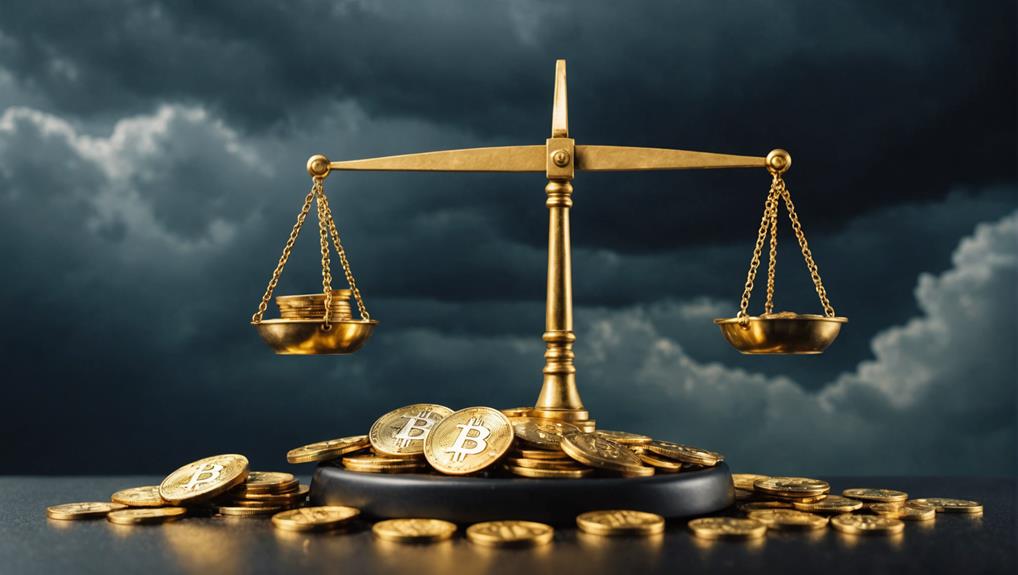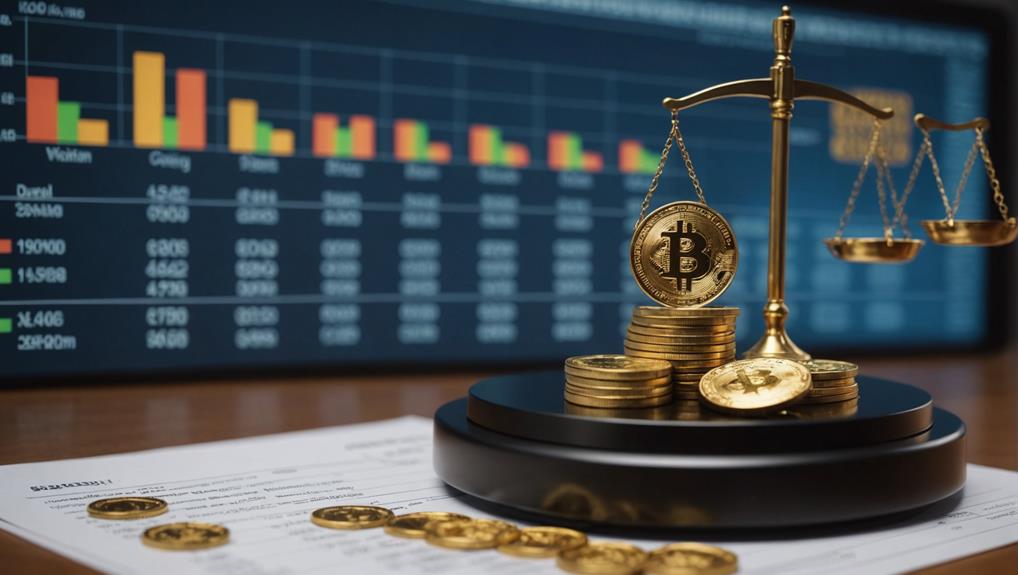Is Investing in Digital Gold Good or Bad?
Investing in digital gold sparks a debate that hinges on weighing its benefits against potential risks. Digital gold offers unmatched convenience, allowing investors to easily buy, sell, and monitor their holdings in real time without the constraints of physical storage.
However, concerns about market fluctuations and regulatory uncertainties loom large. Delving into this modern investment avenue prompts reflection on its impact on portfolio diversification and financial stability.
Is digital gold a promising investment for the future or a complex trend that may fade?
Key Insights
- Digital gold offers unparalleled accessibility and convenience for small investments.
- Lack of regulatory clarity and potential security breaches pose significant risks.
- Market volatility can lead to rapid value fluctuations affecting returns.
- Secure storage in insured vaults ensures safety without physical storage concerns.
- Taxation rules and fees can impact overall returns on digital gold investments.
Understanding Digital Gold

Digital gold, a modern alternative to traditional gold investments, comprises 24K 99.9% pure gold securely stored in insured vaults. This innovative investment option offers enhanced security and transparency. Being a digital asset, it enables investors to easily buy and sell portions at current market rates, ensuring flexibility and seamless transactions.
Accessibility is improved as investors can start with investments as low as Re. 1, catering to a wider range of participants. Platforms that provide digital gold services ensure its purity and offer real-time rate tracking, instilling confidence in investors. Detailed transaction records maintain transparency, providing investors with clear visibility into their holdings and market performance.
This contemporary approach streamlines the process of investing in gold significantly.
Advantages of Digital Gold
Digital gold presents several compelling advantages for investors. It offers the flexibility to invest with minimal amounts, even as low as Re. 1, making it accessible to a wide range of individuals.
Moreover, it ensures secure storage in insured vaults and provides real-time tracking of market rates, enhancing both convenience and security for investors.
Small Investment Flexibility
With the capability to begin investing with as little as Re. 1, digital gold offers unparalleled flexibility for individuals with limited capital. This level of accessibility allows a diverse range of people to engage in the gold market, even with modest investments.
By gradually acquiring digital gold in small increments, investors can diversify their portfolios without a significant initial outlay. This feature is particularly beneficial for new investors or those hesitant to commit large sums at the outset.
Investing small amounts also enables individuals to gain insights into market trends before expanding their investment size. In essence, digital gold caters to those looking to build their gold portfolio steadily, promoting inclusivity and financial accessibility.
Secure Storage Solutions
Digital gold offers secure storage solutions as a key benefit alongside its investment flexibility. Investors can take advantage of insured vaults, which remove the need for physical storage worries typically associated with traditional gold holdings. This eliminates the burden of safeguarding physical gold, as secure vault storage guarantees the safety and protection of investments.
With insured vaults ensuring the security of digital gold holdings, investors can have peace of mind knowing their assets are well-protected. The convenience and security provided by these storage solutions enhance the attractiveness of digital gold as compared to physical gold, making it a preferred choice for those seeking a reliable and hassle-free investment option.
Real-Time Market Rates
Digital gold offers investors the invaluable advantage of accessing real-time market rates, allowing them to monitor the value of their investment continuously. This transparency empowers investors to track price fluctuations, make well-informed decisions, and optimize their investment strategy.
By providing visibility into the current value of digital gold, real-time market rates enable investors to respond promptly to market changes, enhancing their overall investment experience. With up-to-date information at their fingertips, investors can capitalize on market movements strategically, maximizing returns and effectively managing risks.
This dynamic feature of digital gold ensures that it remains a responsive and reliable investment option for individuals seeking to stay informed and proactive in their investment endeavors.
Disadvantages of Digital Gold

Investing in digital gold, despite its allure, presents several drawbacks that investors must carefully weigh. A key concern is the lack of regulatory clarity surrounding digital gold, which can expose investors to legal and compliance risks due to the absence of stringent government oversight.
Additionally, the vulnerability of platforms hosting digital gold to security breaches and data theft poses a significant threat to investors' assets. The volatile nature of the digital gold market can result in rapid fluctuations in value, heightening the investment risk compared to more stable options.
Furthermore, the lack of physical ownership may deter individuals who prefer tangible assets, as digital gold only exists in electronic form. Lastly, the fees and charges associated with buying and selling digital gold can diminish potential returns, further impacting investors' bottom line.
Digital Gold Vs Physical Gold
When comparing digital gold to physical gold, several key factors come into play, including investment flexibility, purity, storage, and resale value. Here's a breakdown of the main distinctions between the two:
Investment Flexibility:
Digital gold offers the advantage of allowing small, unrestricted investments, making it accessible to a wider range of investors. On the other hand, physical gold necessitates a significant initial capital outlay, limiting entry for some.
Purity:
Digital gold provides the assurance of guaranteed purity and real-time tracking, ensuring transparency for investors. In contrast, physical gold's purity can vary, leading to uncertainties for buyers.
Storage:
Physical gold demands secure storage arrangements, often incurring additional costs for safeguarding the precious metal. In contrast, digital gold eliminates the need for physical storage, offering convenience and cost savings.
Resale Value:
Physical gold typically holds a higher resale value and is universally accepted for cash exchange, providing liquidity to investors. Meanwhile, digital gold may face limitations in terms of resale options and acceptance in the market.
Both digital and physical gold investments are subject to taxation, with rates varying based on the holding period. These considerations play a crucial role in shaping investment decisions for individuals looking to diversify their portfolios.
Why Investors Choose Digital Gold

Investors are increasingly drawn to digital gold for its unparalleled accessibility and convenience. With the option to invest as little as Re. 1, it appeals to those seeking diversified asset allocation without requiring a significant initial investment.
The liquidity of digital gold is a key allure; investors can effortlessly convert their holdings into physical gold or cash, offering flexibility to adapt to market fluctuations. Real-time tracking of gold rates and seamless online transactions enhance its attractiveness.
In contrast to physical gold, digital gold eliminates storage and security worries, reducing certain investment risks. Consequently, digital gold is emerging as a favored choice for a well-rounded portfolio, combining the stability of gold with the efficiency of digital currency.
Buying Digital Gold in India
When purchasing digital gold in India, investors have access to a variety of top platforms like MMTC-PAMP, Paytm, and HDFC Bank, each offering unique features and benefits.
It is essential to understand the regulatory landscape governing digital gold to ensure compliance and secure investments.
Moreover, investors should consider strategic approaches, including evaluating provider credibility and monitoring real-time gold rates, to optimize their investment decisions.
Top Platforms for Purchase
India offers a wide array of reliable platforms for purchasing digital gold, ranging from established financial institutions to innovative fintech startups. These platforms not only provide various investment options but also simplify the process for investors looking to acquire digital gold.
Here are the top four platforms for purchasing digital gold:
- MMTC-PAMP India Private Limited: Renowned for its exceptional standards, this platform is a leading supplier of digital gold.
- Fintech Companies: User-friendly platforms offered by Paytm and PhonePe cater to individuals interested in investing in digital gold.
- Banks: HDFC Bank and ICICI Bank provide secure channels for purchasing digital gold through their financial services.
- Brokerage Houses: Companies like Motilal Oswal and Angel Broking facilitate digital gold transactions, offering a wide range of investment options.
These platforms cater to a diverse range of investor preferences, ensuring secure and efficient transactions.
Regulatory Landscape Overview
Navigating the regulatory landscape is essential for investors seeking to engage in digital gold transactions in India, where various platforms offer investment opportunities. Stringent regulatory measures govern major providers like MMTC-PAMP India Private Limited, ensuring the security and transparency of investments.
Fintech giants such as Paytm and PhonePe, in collaboration with established banks like HDFC Bank and ICICI Bank, facilitate seamless digital gold transactions, expanding investment avenues for consumers. Moreover, brokerage firms like Motilal Oswal and Angel Broking, along with initiatives like Stock Holding Corporation of India's GoldRush program, present additional options for investors. These entities adhere to financial regulations, safeguarding the integrity and safety of digital gold investments.
Therefore, investors must grasp the regulatory frameworks underpinning these platforms to make informed investment decisions.
Investment Strategies Considerations
Crafting an optimal investment strategy for purchasing digital gold in India necessitates a comprehensive evaluation of key factors to make well-informed decisions. Investors should consider a range of critical aspects to maximize returns and minimize risks effectively.
To begin, investors should analyze various digital gold forms available in the market such as Sovereign Gold Bonds (SGBs), Gold ETFs, and MCX contracts. By comparing the advantages and disadvantages of each option, investors can determine the most suitable choice aligned with their investment goals.
In addition to evaluating different investment strategies, it is essential to prioritize risk management. This involves assessing the credibility and reputation of digital gold providers like Paytm, HDFC Bank, and MMTC-PAMP. Understanding regulatory risks associated with these providers can help mitigate potential losses and safeguard investments.
Furthermore, staying abreast of current market trends is crucial. Keeping track of market conditions enables investors to make well-timed investment decisions, optimizing potential returns on digital gold investments.
Moreover, diversification plays a key role in investment planning. By incorporating digital gold alongside other assets in a well-balanced portfolio, investors can spread risk and enhance overall stability, mitigating potential fluctuations in the market.
Taxation of Digital Gold

Understanding the taxation rules for digital gold investments is essential for maximizing financial returns. Both digital and physical gold investments are subject to specific guidelines.
A 3% GST is levied during the purchase and sale of digital gold, mirroring transactions in physical gold. When holding digital gold for over three years, any gains are taxed at a rate of 20% with the benefit of indexation. These taxation rules apply to both digital and physical gold investments, impacting the overall returns.
Recognizing and accounting for the tax implications associated with digital gold investments is crucial for effective financial planning and decision-making.
Mitigating Risks in Digital Gold
Mitigating risks in digital gold investments necessitates a comprehensive approach encompassing meticulous scrutiny, regulatory acumen, and strategic deliberation. To effectively manage potential pitfalls, consider the following risk management strategies:
- Thorough Examination:
Prioritize evaluating the reputation and credibility of digital platforms offering digital gold. Verify the presence of secure systems and transparent operations to ensure a safe investment environment.
- Regulatory Landscape Awareness:
Stay abreast of the latest regulations and uncertainties concerning digital gold investments. A deep understanding of these dynamics is crucial for navigating the legal intricacies of the investment landscape.
- Transparent Fees and Charges Disclosure:
Dive into a thorough understanding of all terms, fees, and charges associated with digital gold investments. Clarity on these costs from the outset empowers investors to make well-informed financial decisions.
- Diversification Strategy:
Opt for diversifying investments across various digital gold forms such as Sovereign Gold Bonds (SGBs), Gold ETFs, and MCX contracts. Diversification serves as a robust risk mitigation tool against concentrated investment risks.
Conclusion
Investing in digital gold presents numerous benefits, such as flexibility, accessibility, and enhanced security, all while eliminating the hassles associated with physical storage. It is crucial, however, to be mindful of potential risks like market volatility and regulatory uncertainties.
When comparing digital gold to its physical counterpart, distinct advantages and disadvantages become apparent for each option. A thorough understanding of taxation implications and the implementation of risk-mitigation strategies are essential in making informed investment choices.
Ultimately, digital gold emerges as a contemporary and efficient alternative to traditional gold investments, catering to a diverse array of investors.
The Gold Information Network
11900 Biscayne Blvd, Ste 127B, Miami, FL 33181
(305) 449-9094
https://goldinfo.net
source https://rondewitt.com/digital-gold-good-bad/
Comments
Post a Comment